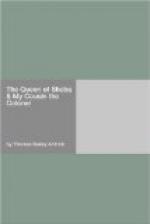Edward Lynde soon passed beyond the limits of the town, and was ascending a steep hill, on the crest of which he proposed to take a farewell survey of the picturesque port throwing off its gauzy counterpane of sea-fog. The wind blew blithely on this hilltop; it filled his lungs and exhilarated him like champagne; he set spur to the gaunt, bony mare, and, with a flourish of his hand to the peaked roof of the Nautilus Bank, dashed off at a speed of not less than four miles an hour—for it was anything but an Arabian courser which Lynde had hired of honest Deacon Twombly. She was not a handsome animal either—yellow in tint and of the texture of an ancestral hair-trunk, with a plebeian head, and mysterious developments of muscle on the hind legs. She was not a horse for fancy riding; but she had her good points—she had a great many points of one kind and another—among which was her perfect adaptability to rough country roads and the sort of work now required of her.
“Mary ain’t what you’d call a racer,” Deacon Twombly had remarked while the negotiations were pending; “I don’t say she is, but she’s easy on the back.”
This statement was speedily verified. At the end of two miles Mary stopped short and began backing, deliberately and systematically, as if to slow music in a circus. Recovering from the surprise of the halt, which had taken him wholly unawares, Lynde gathered the slackened reins firmly in his hand and pressed his spurs to the mare’s flanks, with no other effect than slightly to accelerate the backward movement.
Perhaps nothing gives you so acute a sense of helplessness as to have a horse back with you, under the saddle or between shafts. The reins lie limp in your hands, as if detached from the animal; it is impossible to check him or force him forward; to turn him around is to confess yourself conquered; to descend and take him by the head is an act of pusillanimity. Of course there is only one thing to be done; but if you know what that is you possess a singular advantage over your fellow-creatures.
Finding spur and whip of no avail, Lynde tried the effect of moral suasion: he stroked Mary on the neck, and addressed her in terms that would have melted the heart of almost any other Mary; but she continued to back, slowly and with a certain grace that could have come only of confirmed habit. Now Lynde had no desire to return to Rivermouth, above all to back into it in that mortifying fashion and make himself a spectacle for the townsfolk; but if this thing went on forty or fifty minutes longer, that would be the result.




